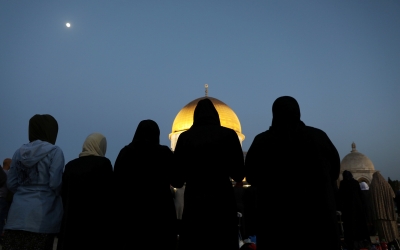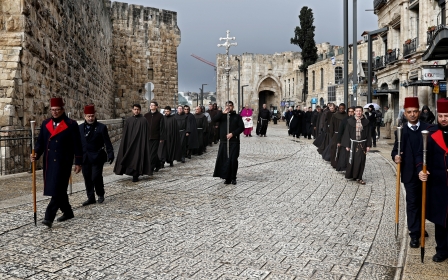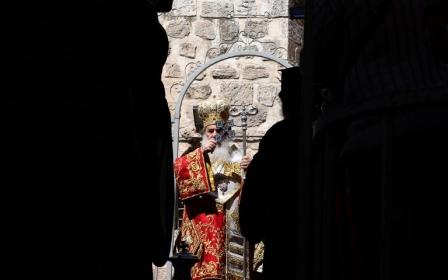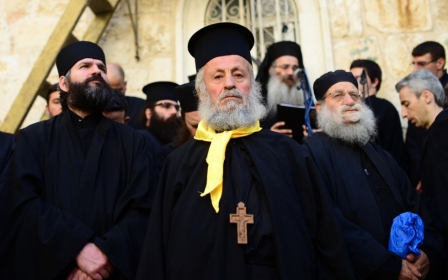On Orthodox Christmas, Palestinians continue boycott of Jerusalem patriarch
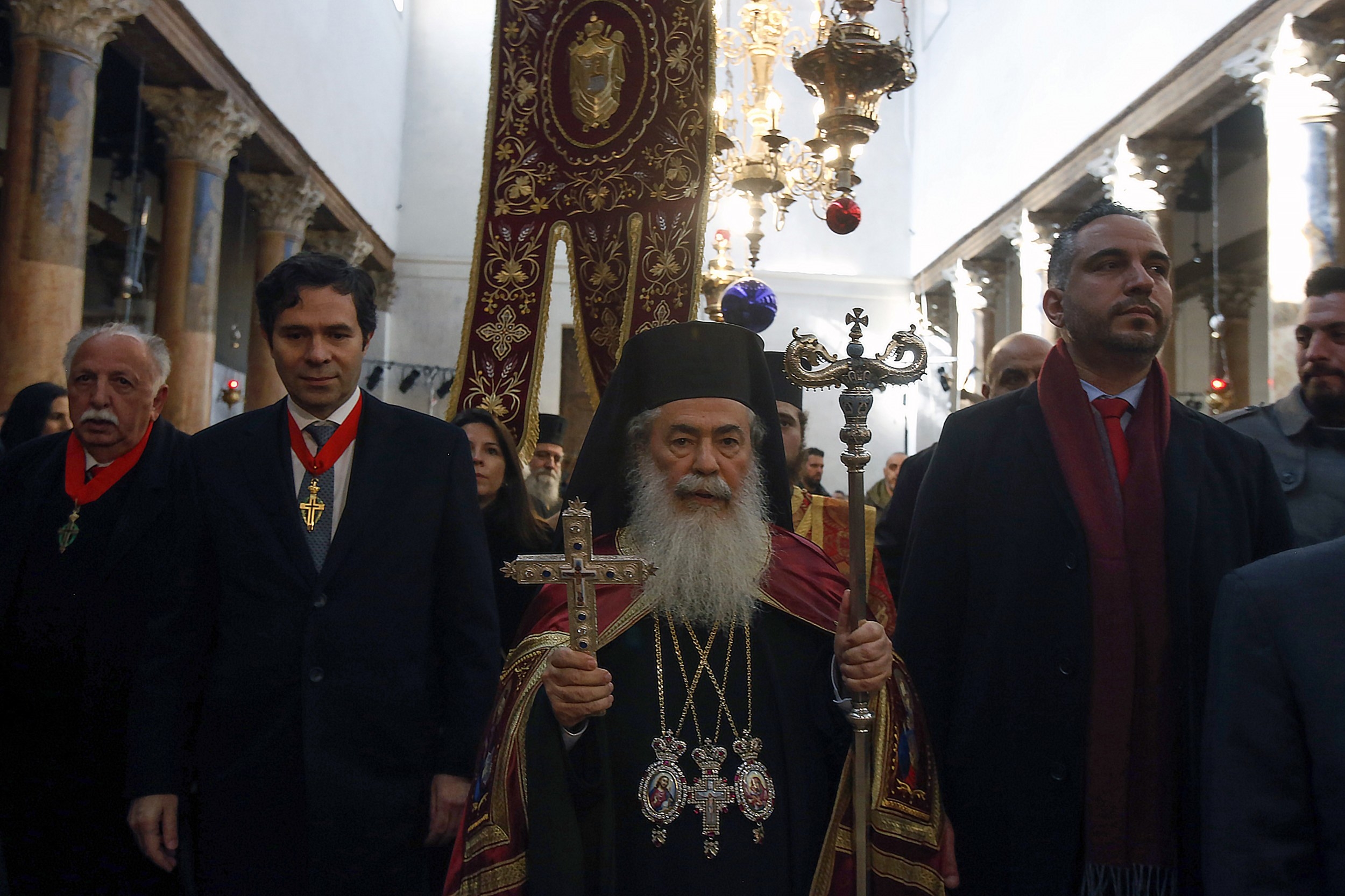
As Eastern Christians celebrated Christmas on Tuesday, Palestinian demonstrators denounced the role played by the Greek Orthodox Church of Jerusalem in the sale of church real estate to Israeli settler groups.
"Traitor” and “unworthy," Palestinian activists chanted on Monday in the occupied West Bank city of Bethlehem as Patriarch Theophilos III and an accompanying procession reached the Church of the Nativity ahead of the traditional Christmas midnight mass.
New MEE newsletter: Jerusalem Dispatch
Sign up to get the latest insights and analysis on Israel-Palestine, alongside Turkey Unpacked and other MEE newsletters
Activists and Christian groups have staged a boycott for three years in a row, denouncing Theophilos’ involvement in the sale and rental of real estate belonging to the Orthodox Church to Israeli settlement companies, deals which were unveiled in recent years.
Several Palestinian Orthodox Christian institutions issued a public statement on 3 January, confirming that they were boycotting the reception of the procession in Bethlehem, as well as abstaining from participating in popular celebrations with the patriarch, in accordance with a decision by the Orthodox National Conference made in October 2017 after the deals were revelealed.
Intra-Orthodox tensions
In 2004, Israeli settler organisation Ateret Cohanim bought the leases to three Greek Orthodox Church properties inside the Old City of Jerusalem through foreign private companies.
The Israeli Supreme Court approved the sale in June last year, putting an end to a 14-year legal battle between Ateret Cohanim and the Greek Orthodox Patriarchate. The case was heard by Israel's highest court after Jerusalem's district court approved the transactions on several legal grounds in August 2017.
The Patriarchate's rejected appeal argued that the sales were corrupt and that Ateret Cohanim bribed Nicholas Papadimas, the head of the church's financial affairs in the city.
The three assets are seen as having high importance due to their strategic locations in both the Christian and Muslim quarters of the Old City, which lies in occupied East Jerusalem - as Israeli authorities have long been accused of seeking to erase the Palestinian presence in Jerusalem through a process referred to as Judaisation.
Jerusalem's Old City was occupied by Israel in 1967. Israeli settlements in East Jerusalem, which the Palestinians see as the capital for a future state, are illegal under international law.
Protesters targeted
Osama Ghabris, a member of the Orthodox Truth Movement which opposes Theophilos, told MEE that individuals in plain clothes - which he believed were undercover Palestinian intelligence officers - targeted the protesters outside the Nativity Church on Monday and tried to prevent them from filming and chanting against Theophilos.
'We were attacked by people in civilian clothes who insulted us'
- Osama Ghabis, Orthodox Truth Movement
"We were attacked by people in civilian clothes who insulted us," he said, adding that four people confiscated his phone and deleted all photos and videos of the event before fleeing the scene.
“We are trying to find out who they are and prosecute them," Ghabris added.
Ghabris said he came to protest in Bethlehem along with other residents of the Palestinian majority village of Ableen in Israel in order to call for Theophilos’ removal.
For Ghabris and other fellow protesters, another key demand is for the Arab and Palestinian Orthodox community to be more directly involved in the management of church affairs in Jerusalem.
The church property scandal has revived frustrations within the Palestinian Orthodox community over the makeup of the Orthodox leadership in Jerusalem, which has been officially dominated by the Greek clergy since the 17th century.
For critics, this has meant the church leadership has not shared the same level of concern as the broader Palestinian public for the preservation of property from Israeli attempts at claiming Jerusalem.
A 'political machine'
Jalal Barham, the head of the Arab Orthodox Club of Beit Sahour and a member of the Orthodox Central Council in Jordan and Palestine, told Middle East Eye that the movement aimed to denounce both Theophilos’ failure to act, as well as broader corruption within the patriarchate.
"Theophilos executed dozens of deals, all of which are documented... which serve the [Israeli] occupation’s efforts to change the identity of Jerusalem and Judaise it," Barham said.
"The patriarch wastes the property of the church and works for the benefit of the occupying power, which is hostile to us, the Church, its sons and all the Palestinian people... and it [Israel] is plotting to implement the the deal of the century," he added, referring to the oft-criticised US proposal for Israel and Palestine.
Barham accused Theophilos of acting outside the teachings and morals of Jesus Christ, and acting not as a clergyman, but as part of a “political machine” by disposing of church properties for little money.
"This patriarch is now popularly isolated,” he said. “He has no right to share our religious festivals and celebrations, and we demand that the Palestinian Authority and Jordan take a clear stand against him and isolate him."
Middle East Eye delivers independent and unrivalled coverage and analysis of the Middle East, North Africa and beyond. To learn more about republishing this content and the associated fees, please fill out this form. More about MEE can be found here.



